|
|
|
Sort Order |
|
|
|
Items / Page
|
|
|
|
|
|
|
| Srl | Item |
| 1 |
ID:
127099
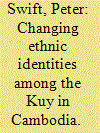

|
|
|
|
|
| Publication |
2013.
|
| Summary/Abstract |
The Kuy are one of the largest Indigenous groups in Cambodia. Though they are extremely similar to the Khmer in terms of physical appearance and material culture, a significant distinction between the two groups continues to be maintained. At the same time, assimilation into the Khmer identity has been a dominant trend among the Kuy for a considerable time and appears to be related to the relatively lower status of the Kuy identity. However, over the past decade or more, some people have begun to reassert a Kuy identity, driven by awareness of benefits of identifying as Kuy and a lessening of the stigmatisation of the Kuy identity. Following the introduction in Cambodia of the concept of Indigenous Peoples, 'Indigenous' has become an ethnic identity that more and more Kuy are assuming and within which they are becoming prominent. It is associated with a broader Indigenous community inside and outside of Cambodia which is becoming increasingly respected. The Indigenous identity has been able to inspire pride and confidence in a way that the Kuy identity has not and has played an important role in letting people of Kuy ancestry 'become Kuy'.
|
|
|
|
|
|
|
|
|
|
|
|
|
|
|
|
| 2 |
ID:
127128
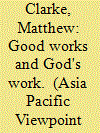

|
|
|
|
|
| Publication |
2013.
|
| Summary/Abstract |
Eighty per cent of the world's population profess religious faith, making religious belief a common human characteristic found in all cultures and societies. Within development studies' literature and practice, religion and faith have been largely ignored or misunderstood. While religious organisations are primarily concerned with providing spiritual leadership, an interest in the physical welfare of their communities is also a core aspect of their existence. Within Vanuatu, an important community space is the church building with a range of community development activities taking place within it. This case study considers how community development activities are incorporated into the daily ministries of Christian Churches in Vanuatu, including the use of church buildings as the location for these activities.
|
|
|
|
|
|
|
|
|
|
|
|
|
|
|
|
| 3 |
ID:
127084
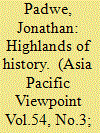

|
|
|
|
|
| Publication |
2013.
|
| Summary/Abstract |
The notion that Cambodia's highland people may claim a distinct 'Indigenous' identity has emerged only recently in Cambodia. To date, advocacy for rights under the banner of indigeneity has produced few results for highlanders. Among the problems faced by advocates for Indigenous rights, problems of definition and translation represent an important challenge. Arguing that concepts like 'Indigeneity' are not simply adopted ex nihilo in new settings, but are rather incorporated into existing structures of meaning, this paper explores culturally produced understandings of who highlanders are, concentrating in particular on the way that the term 'Indigenous' has been translated into Khmer. The use of the Khmer word daeum, or 'original', to distinguish between Indigenous and other forms of ethnic belonging in the newly derived translation of 'Indigenous Peoples' points to historically sedimented beliefs about highlanders as living ancestors of modern Khmers.
|
|
|
|
|
|
|
|
|
|
|
|
|
|
|
|
| 4 |
ID:
127083
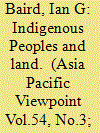

|
|
|
|
|
| Publication |
2013.
|
| Summary/Abstract |
In 2001 a new Land Law was adopted in Cambodia. It was significant because - for the first time - it recognised a new legal category of people, 'Indigenous Peoples' or chuncheat daoem pheak tech in Khmer, and it also introduced the legal concept of communal land rights to Cambodia. Indigenous Peoples are not mentioned in the 1993 constitution of Cambodia or any legislation pre-dating the 2001 Land Law. However, Cambodia's 2002 Forestry Law also followed the trend by recognising 'Indigenous Peoples'. These laws have been both symbolically and practically important, as they have provided government-mandated legitimacy to Indigenous identities and associated land and forest rights, including communal land rights, and have been ontologically significant in dividing Indigenous and non-Indigenous Peoples on legal grounds. Over a decade after the 2001 Land Law was promulgated, this article considers some aspects of its effects. In particular, when compared with the potential for developing communal land rights in Laos, one has to wonder how advantageous it is to adopt Indigenous identities and the types of communal land rights and community forestry rights presently possible in Cambodia.
|
|
|
|
|
|
|
|
|
|
|
|
|
|
|
|
| 5 |
ID:
127141


|
|
|
|
|
| Publication |
2013.
|
| Summary/Abstract |
Marine protected areas are recognised as an important marine management strategy to deal with a range of user conflicts and over-exploitation of marine resources. This article explores the experiences of establishing a marine protected area as part of Bunaken National Park in the north of Indonesia's Sulawesi Province. The challenges faced in relation to institutional issues are examined. A literature review, key informant interviews and analysis of official documentation provide evidence regarding issues around government conflicts and the legal and structural issues of the management advisory board. The analysis identifies key issues regarding the conflict between the government and the management board that are influencing the success of managing this National Park.
|
|
|
|
|
|
|
|
|
|
|
|
|
|
|
|
| 6 |
ID:
127100


|
|
|
|
|
| Publication |
2013.
|
| Summary/Abstract |
Based primarily on fieldwork with Kuy peoples in Rovieng District, Preah Vihear Province, this article examines contemporary Indigeneity in Cambodia as an emergent heterogeneous and polythetic identity vis-à-vis the changing nature of the state, and suggests that a more substantive political engagement with Indigenous identity and history offers a pluricultural reframing of the world heritage of Cambodia and a possible source of alternative land regimes that are more sustainable and equitable than the current dominant neoliberal model of land concessions. Although the 2001 Cambodian National Land Law holds critical significance for Indigenous Peoples in pursuit of communal land rights, it has largely failed to protect rights because of (i) persistent discrimination against groups now claiming Indigenous identities, embedded in state procedures of Indigenous identity and land registration; and (ii) the state's demonstrated embrace of land concession regimes as the preferred strategy of economic development. The Delcom mining concession of Kuy lands provides one example of the destructive impacts of this strategy. An examination of the evidence of Kuy peoples' history suggests that their classification as ethnic minorities is of recent origins, and that in the past they played more active roles in Cambodian state-building projects.
|
|
|
|
|
|
|
|
|
|
|
|
|
|
|
|
| 7 |
ID:
127138


|
|
|
|
|
| Summary/Abstract |
In the post-Mao era from the 1980s, market reforms have seen profit-led neoliberal forces being introduced into China's urban spatial movements. In supporting such movements, labour mobility is allowed but the hukou system has been retained to prevent urban informality and slum formation and to control municipal public expenses. Without residency permits granted by the host cities, low-wage rural migrants enjoy little 'right to the city' and are deprived of local welfare and benefits. They often become 'drifting tenants', frequently driven by urban renewal, rising rentals and change of jobs. This study examines the spatial effect of causes (residency system) and consequences (frequent shifts in residence) experienced by low-skilled and low-wage migrants. A survey was conducted from February to mid-April 2011 in northwestern Beijing's Great Zhongguancun area which shows the marginalised state of displaced migrant tenants. This includes their adaptations to change, the pattern, causes and history of their intra-city mobility.
|
|
|
|
|
|
|
|
|
|
|
|
|
|
|
|
| 8 |
ID:
127142
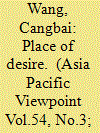

|
|
|
|
|
| Publication |
2013.
|
| Summary/Abstract |
Until very recently the motivation of skilled migration has been largely explained from neo-classically oriented world views coupled with an institutional focus that pays major attention to how skilled migration is driven by (economic) globalisation and sustained by inter- or intra-company economic and social connections. Little is said about how dream and aspiration have shaped migration plans and choices of destination. Although the recent development of academic literature witnesses a shift away from a narrow focus on economic logics to the human face of transnational skills, the issue of desire only accidentally emerges in most discussions. Based on in-depth interviews with mainland Chinese professional migrants in post-colonial Hong Kong, this paper foregrounds the notion of 'desire' as a conceptual vehicle to interweave economic, political and cultural dimensions within the same frame to understand the intentions and dynamics of skilled migration, and to link decision-making at the individual level to a broader geo-politics and geo-economies in which migration takes place. In-depth interviews reveal that apart from economic and career considerations, decisions to migrate were marked by aspiration and fantasy associated with cultural imagination of post-colonial Hong Kong embedded in discourses of place, border and nationhood that go beyond the specific issue of China-Hong Kong migration.
|
|
|
|
|
|
|
|
|
|
|
|
|
|
|
|
| 9 |
ID:
127122


|
|
|
|
|
| Publication |
2013.
|
| Summary/Abstract |
Two opposing land tenure policies are being implemented in upland Cambodia: indigenous communal title, the product of a decade of advocacy for indigenous rights; and Order 01, a dramatic new initiative to provide private individual titles to thousands of farmers living on state public land. This policy conflict has precipitated painful deliberations in Indigenous villages, whereby the merits of inalienable communal title must be weighed against its risks and constraints; and individual titles must be scrutinised for their potential to accelerate alienation and render frontier areas 'legible' for government and markets. I examine these issues through the experiences of one village in Mondulkiri, which recently 'reconciled' its communal title claim with the new individually motivated reforms. The village exemplifies Cambodia's commodity frontier: it is of mixed Bunong-Khmer ethnicity, and has undergone rapid deforestation and market integration since 2005. Thus, when the individual titling commenced in 2012, the already-fragile communal land claim was abandoned by 25% of its constituents. I explore how this unfolded, revealing powerful moral and racial narratives around Bunong identity and the processes of land fragmentation, commodification and alienation. I also reveal how these processes are enabled by Cambodia's predatory regime, of which Order 01 is an intimate part.
|
|
|
|
|
|
|
|
|
|
|
|
|
|
|
|
|
|
|
|
|